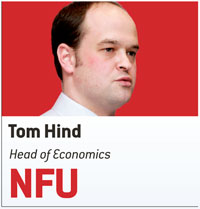Set-aside News Special: The case for a voluntary scheme

When Hilary Benn launched the official consultation into measures to recapture set-aside’s supposed environmental benefits, he reiterated his support for an industry-led voluntary approach if it can deliver what is needed.
Join the lively debate on set-aside on our forums |
|---|
The NFU is not only convinced that the industry can come up with something that will satisfy the requirements put forward by DEFRA within the timescale, but also that we can work together to develop a targeted voluntary approach which, we are certain, would be much more successful than blunt regulation.
This proposal would be based around the creation of a Farm Environment Action Plan (FEAP) which, among other things, would see an industry-led group set up to oversee the creation and delivery of the plan as well as a plan to specifically develop and promote land management practices. These would be through Environmental Stewardship and non-Environmental Stewardship measures that address the habitat needs of farmland birds.
We see a clear and stark choice in the two options put forward in the consultation paper. That choice will be between an option we think will adversely affect farmers’ existing stewardship options, add to regulatory burdens and force land out of production at a time when food production and food security has never been more important, and one that will champion those farmers who are already doing the right thing and encourage others to do their bit to promote a sustainable, productive environment.
The consultation document acknowledges that the benefits of any measures put in place may not be apparent for a number of years and the same argument has to be applied to the impact of set-aside removal. We are as worried as anyone by the decline in some farmland birds, but there is no evidence that reintroducing set-aside will have any positive impact. One thing we must not lose sight of is the fact that the industry takes its environmental responsibilities seriously. For the past 20 years, farmers have participated in voluntary agri-environment schemes, which, among other things, protect and enhance habitats and biodiversity and bring about positive changes to land use and management.
Uptake
The Entry Level Scheme alone covers over 50% of the eligible agricultural land in England, and this rises to 65% if you include uptake of all the other agri-environment schemes as well.
Ministers have said they see the potential of an approach that does not rely on regulation. This is a positive signal for the farming industry. We believe a chance has been presented to show again how voluntary, industry-led approaches like the Voluntary Initiative and Environmental Plan for Dairy Farming can win the hearts and minds of farmers and achieve lasting change. It is a chance that must not be missed and we will need all our partners, especially those in government, working with us. We are determined to work with them to show that the industry is serious about what it can achieve and that it can succeed in its aims.
